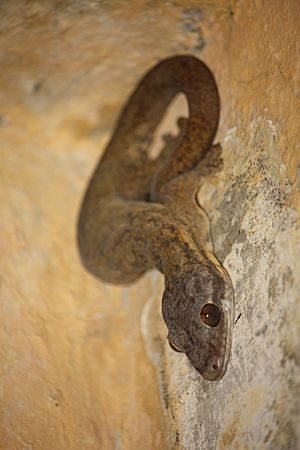Turnip-tailed gecko facts for kids
Quick facts for kids Turnip-tailed gecko |
|
|---|---|
 |
|
| in Dominica | |
| Conservation status | |
| Scientific classification |
|
| Kingdom: | Animalia |
| Phylum: | Chordata |
| Class: | Reptilia |
| Order: | Squamata |
| Family: | Phyllodactylidae |
| Genus: | Thecadactylus |
| Species: |
T. rapicauda
|
| Binomial name | |
| Thecadactylus rapicauda (Houttuyn, 1782)
|
|
| Script error: The function "autoWithCaption" does not exist. | |
| Synonyms | |
|
|
Script error: No such module "Check for conflicting parameters".
The turnip-tailed gecko (Thecadactylus rapicauda) is a type of gecko found in many places. You can find it from Mexico through Central America and down into South America, even in Brazil. It also lives on many islands in the Lesser Antilles. For a long time, people thought it was the only gecko in its group, but then another species was found in 2007.
Contents
About the Turnip-Tailed Gecko
This gecko is quite large. It can grow up to 120 millimeters (about 4.7 inches) long, not counting its tail. Its color can change a lot, from light gray to dark gray or even bright orange. These geckos can also change their color to blend in.
They can make chirping sounds, especially at night when they are active. Their name comes from their tail, which looks a bit like a turnip because it's swollen. They use this tail to store fat, like a camel's hump!
Why Their Tail is Special
The turnip-tailed gecko uses its tail in a few important ways. If it feels threatened, it might wave its tail to scare away a predator. Also, like many lizards, it can drop its tail if something grabs it. This is called autotomy. The tail keeps wiggling, distracting the predator while the gecko escapes. A new tail will grow back later.
Where They Live
These geckos are active at night, which means they are nocturnal. During the day, they often rest high up in palm trees, usually about 5 to 30 feet off the ground.
Who Eats Them?
Like many animals, turnip-tailed geckos have predators. One animal that hunts them is a type of bat called the big-eared woolly bat.
Tiny Problems: Parasites
Sometimes, these geckos can get sick from tiny living things called parasites. One type of parasite that can affect them is a malarial parasite.
See also
 In Spanish: Thecadactylus rapicauda para niños
In Spanish: Thecadactylus rapicauda para niños
 | William Lucy |
 | Charles Hayes |
 | Cleveland Robinson |


